
Brain Food For Studying: 25 Brain-Boosting Snacks That Will Help Improve Your Study Sessions, Exam Performance, and More
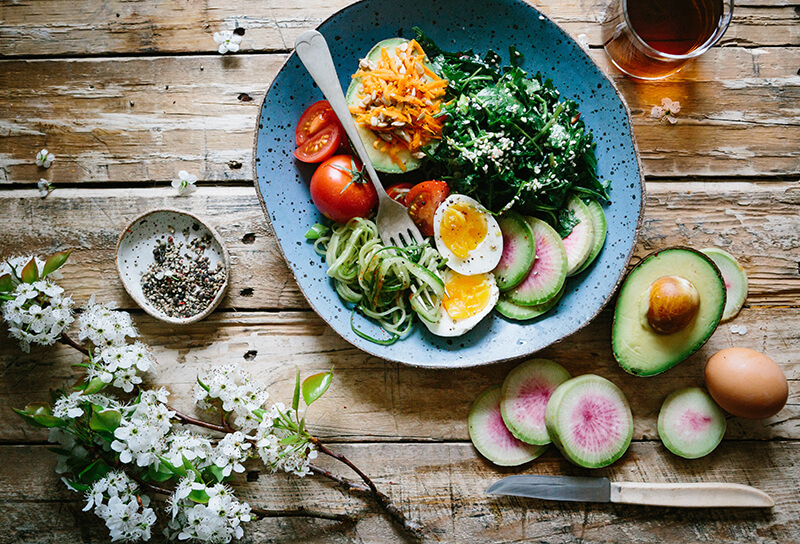 When you’re pulling a late night study session you might enjoy snacking on that bag of chips and energy drink, but while those snacks taste great, it’s not the right brain food for studying effectively.
When you’re pulling a late night study session you might enjoy snacking on that bag of chips and energy drink, but while those snacks taste great, it’s not the right brain food for studying effectively.
Did you know that avoiding junk food while studying can actually help you get better grades? Here’s why: to study productively, you need to call on a few significant brain functions: concentration, memorization, focus, and energy. Junk food can actually get in the way of some of these brain functions, even if that tiny little chocolate bar looks harmless and oh-so-tempting.
With the right brain fuel, you can capitalize on all of these aspects of the brain to harness as much of its power as you can. The more brain power you can use, the better your memory and learning abilities will be, which in turn will get you better grades on exams, essays, and term papers.
So, what is the best brain food for studying and improving your academic performance? We’re going to show you, and we’ve even provided some snack ideas you can try using each of these 25 powerful brain-boosting superfoods.

Why Your Study Snack Matters
If you’re someone who relies on that mid-study session chocolate bar to get through the night, you might be wondering what’s so bad about it. On the outside, it seems like a harmless treat, but it’s not giving you the nutrients your brain needs to power through those study sessions.
We all know that junk food is bad for your body and can lead to heart disease, obesity, and more. However, it’s bad for your brain health, too. According to Neuroscience News, studies have shown that eating too much junk food can actually alter the structure and function of your brain, particularly in the prefrontal cortex which is responsible for controlling decision making, cognitive control, and more elements that are important for studying.
For effective studying, you need to be in peak brain health so you can take really good notes in class, stay alert and take in information from your study materials, and call on your brain power to remember everything when it comes time for exam day.
This list of brain food for studying will provide you with some ideas for study snacks that will do much more than simply satisfy your hunger. Each of these foods has been scientifically linked to at least one core function that is essential to effective studying and academic performance. When you choose the right brain fuel, you will be more than ready and prepared to take on those exams, mid term projects, finals, and term papers with ease.
If you need a little advice to get your grocery list ready, check out our blog on grocery shopping with a student budget. This will help you make sure you can get the foods you need with the budget you have.
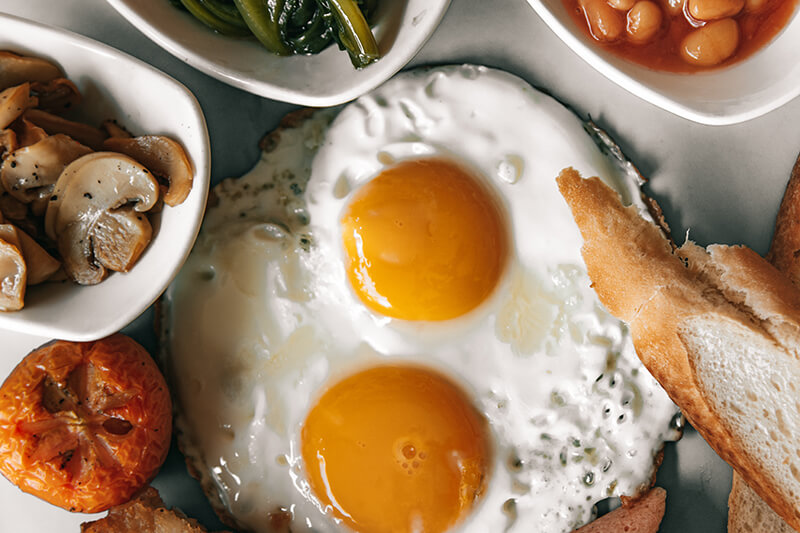
1. Eggs
Eggs are often known in the health world as nature’s multivitamin – in fact, Healthline refers to eggs as “the healthiest food on the planet.” This means eggs are arguably the top most effective brain food for studying. Here’s why: eggs are packed with powerful vitamins, antioxidants, nutrients, and healthy fats that have tons of important benefits such as reducing cholesterol and helping the body build protein. But the really important nutrients in eggs for students are choline, vitamin B12, and selenium. All of these nutrients are linked to better memory storage, coordination, neurological stability, and brain development.
It’s important to note that the most important nutrients for brain function are found within the egg yolk, so tossing back an egg white omelette won’t be effective enough.
Snack ideas:
● Hard boiled eggs
● Scrambled eggs with salsa
● Fried eggs on whole grain toast
● Deviled eggs
● Egg snack bites
● Omelettes
● Baked egg muffins
2. Berries
Deeply coloured berries such as blackberries, blueberries, raspberries, and strawberries, are packed with antioxidants that help brain cells communicate properly. Additionally, most berries contain flavonoids, which are responsible for giving the berries their colour. Flavonoids are known to help improve memory and learning (information intake). Blueberries in particular are a known superfood for tons of different reasons, including cognitive performance, but all berries will help your brain in the long run.
Try to avoid going for dried or canned berries. The manufacturing process to preserve berries this way requires a lot of additives and typically contains tons of extra refined sugar that will defeat the entire purpose of eating the berries in the first place.
Snack ideas:
● Triple berry smoothies
● Greek yogurt topped with berries
● Whole grain cereal topped with berries
● Berry oat snack bars
● Dehydrated strawberry “chips”
● Fruit salad
● Strawberry and goat cheese salad
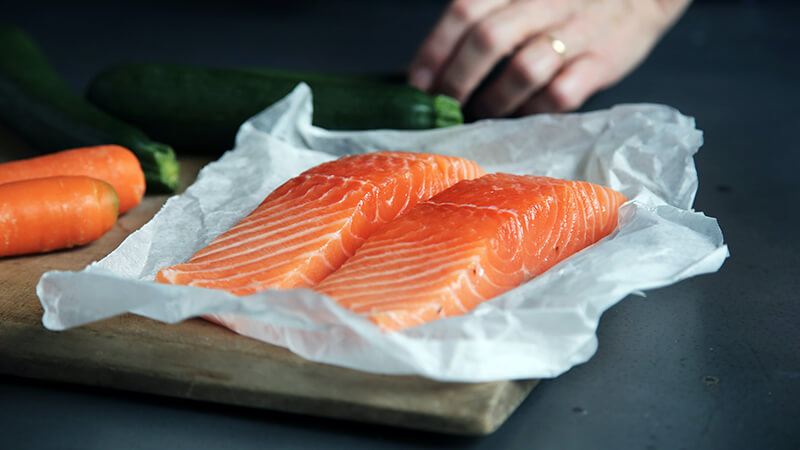
3. Fatty Fish
Not everyone loves fish, but everyone should love the benefits your brain gets from eating fatty fish. Certain types of fatty fish (salmon, trout, tuna, and sardines) contain omega-3s, which is an essential fat that makes up half of the total fat in your brain. These fats are important for memory and learning, building nerve cells, and emotional regulation. In contrast, some studies show that not getting enough omega-3s can lead to learning impairments and depression.
Snack ideas:
● Fish tacos
● Albacore tuna and whole grain crackers
● Fish sticks
● Homemade fish cakes
● Smoked salmon
● Salmon mousse dip with whole grain crackers
● Smoked salmon deviled eggs
4. Avocados
Known for their high levels of healthy fats, avocados contain unsaturated fats that are linked to better cognitive performance. These fats can also help you feel full for longer, so you won’t have to listen to your stomach rumbling while you’re studying.
Avocados are also packed with powerful antioxidants and carotenoids such as lutein, which is important for eye health. You need your eyes to be in good working order so you can properly read your materials and make sure you don’t miss any details in your instructions. Lastly, avocados can also help reduce blood pressure, which is a key function that improves the brain’s ability to do its job.
Snack ideas:
● Avocado toast
● Sliced raw avocados topped with seasoning
● Guacamole with whole grain chips or carrots
● Add avocado to smoothies
● Avocado salad with chicken and kale
● Baked avocado “fries”
● Chocolate avocado pudding
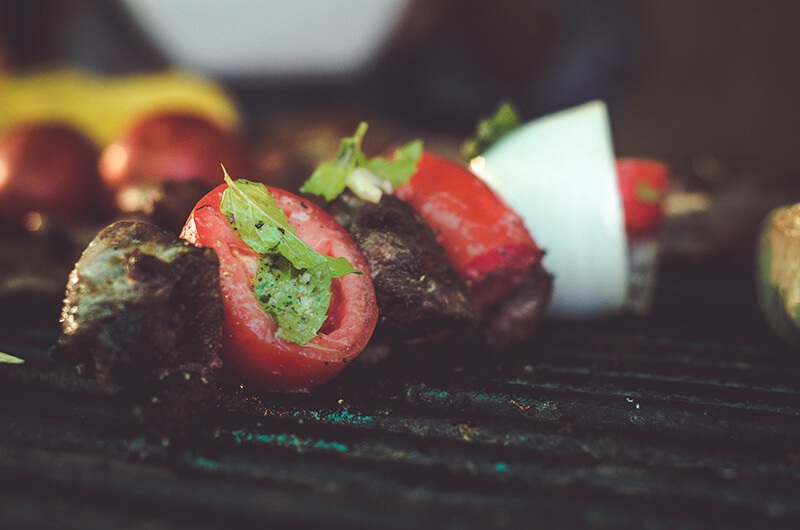
5. Lamb
Red meat often gets a bad reputation in the health world, so it’s probably surprising to see it on a list of good brain food for studying. However, in recent years, scientific research has found that weekly consumption of lamb is linked to better cognitive performance and brain function. Lamb is also packed with protein, which is important for brain function as well because it helps give your brain the energy it needs to stay alert and focused.
Snack ideas:
● Lamb kabobs
● Gyros on whole grain pita bread
● Grilled lamb bites
● Sliced lamb with feta cheese and olive oil
● Lamb stew
6. Turmeric
Turmeric is the spice that gives curry dishes their signature yellow colour, but it’s also one of the most underrated superfoods on the planet. This spice is a key component of herbal medicine in many cultures and countries around the world, and it’s a great brain food for studying, too. Many people even use turmeric supplements in order to maximize their nutritional intake and keep their bodies healthy.
The main active ingredient in turmeric is the powerful anti-inflammatory compound curcumin, which helps with memory storage and memorization in general. This is due to the fact that curcumin has been linked to increases in a protein known as the brain-derived neurotrophic factor (BDNF). The BDNF is the gene that is responsible for prolonging the life of neurons in the brain and is extremely important for memory and learning. Curcumin is also packed with antioxidants that help boost the body’s immune system, protect the brain from damage from free radicals, and help prevent Alzheimer’s disease.
A note about turmeric: it’s often paired with black pepper because black pepper helps the body absorb the full nutritional value of the spice, so try to use this combo if you’re cooking with it.
Snack ideas:
● Turmeric tea
● Add turmeric to hummus and dips with veggies
● Sprinkle turmeric on top of deviled eggs
● Add turmeric to smoothies
● Turmeric energy balls
● Roasted carrots with turmeric spice
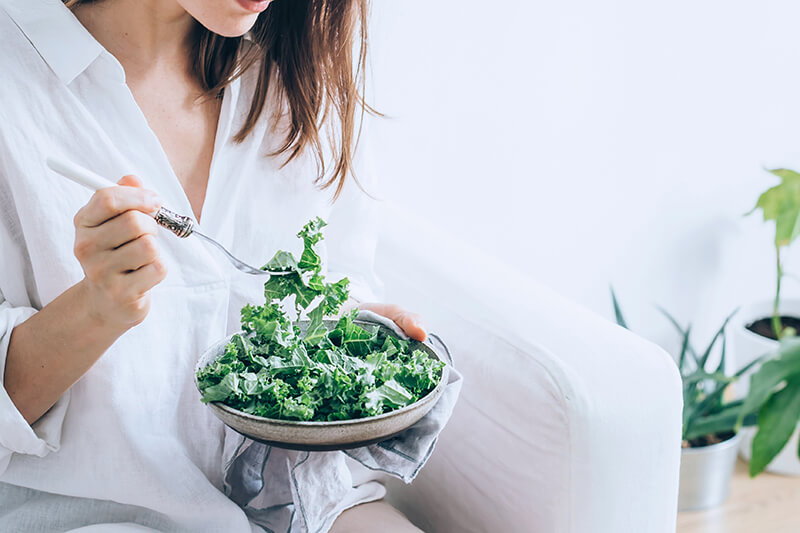
7. Leafy Greens
You’ve probably already heard this before, but many leafy greens are classified as superfoods for the brain. This is especially true for kale, collards, and spinach. These powerful greens contain those helpful flavonoids, as well as important brain-boosting vitamins, and carotenoids (antioxidants).
Scientific studies have also shown that leafy greens help slow cognitive decline and preserve your brain function, so you’re helping your future self out when you munch down on your greens, too.
Snack ideas:
● Green smoothies
● Roasted kale chips
● Salads
● Lettuce wraps
● Make spinach pesto for pasta and pizza
● Green hummus with veggies
● Sauteed spinach with scrambled eggs
● Spinach and feta spanakopita
8. Nuts
Nuts are another group of food known for containing lots of those super essential brain-boosting omega-3s. Most nuts are also very rich in vitamin E, which helps keep free radicals and other environmental toxins from getting into the brain. When those free radicals get in, they start to cause oxidative stress that can speed up cognitive decline as you age, putting you at risk for Alzheimer’s and other neurological diseases. Therefore, not only are they a tasty snack, but that handful of nuts can help boost your brain power and preserve it at the same time.
Snack ideas:
● Trail mix
● Natural peanut butter (without preservatives) and whole grain crackers
● Granola bars with nuts
● Roasted cashews
● Candied pecans
● Dark chocolate peanut brittle
● Nuts, cheese, and whole grain crackers
● Oatmeal walnut cookies
● Dark chocolate covered almonds
● Peanut butter energy bites
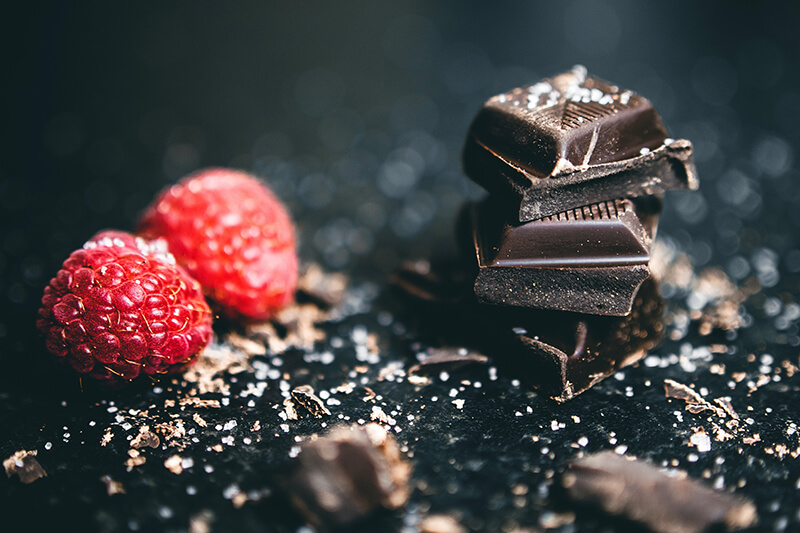
9. Cocoa and Dark Chocolate
Yes, you can have chocolate while you’re studying if it’s dark chocolate. Sure, dark chocolate isn’t everyone’s favourite taste, but if it can help with your chocolate fix it’s better than nothing. Some scientific research has shown that dark chocolate, and cocoa products with high levels of cocoa, have positive effects on cognitive function and can help reduce your risk of mental fatigue. Dark chocolate has the highest cocoa levels, which is why it’s on this list as one of the best snacks to handle a sweet craving while you’re studying.
Snack ideas:
● Dark chocolate covered berries
● Oat clusters with dark chocolate
● Apple slices with dark chocolate and peanut butter
● Energy bites with dark chocolate chips
10. Coffee (Caffeine)
Here is some great news for coffee lovers and students who just can’t get out of bed without the help of that morning java – coffee is actually a good brain food for studying! Health experts have found that caffeine helps the brain stay alert and improves concentration, and can even help you retain information better. Coffee also contains some helpful antioxidants that help boost your mood levels and reduce the risk of neurological diseases such as Alzheimer’s.
So, you can continue to reach for that cup of coffee when you get settled for your study session. Just make sure it’s not your 10th cup of the day – avoid overdoing it because too much caffeine can lead to the jitters and throw off your sleep cycle.
Snack ideas:
● Dark chocolate covered coffee beans
● Coffee energy bites
● Banana coffee smoothies
● Iced coffee
● Zucchini coffee bread
● Oat milk lattes
● Coffee mousse
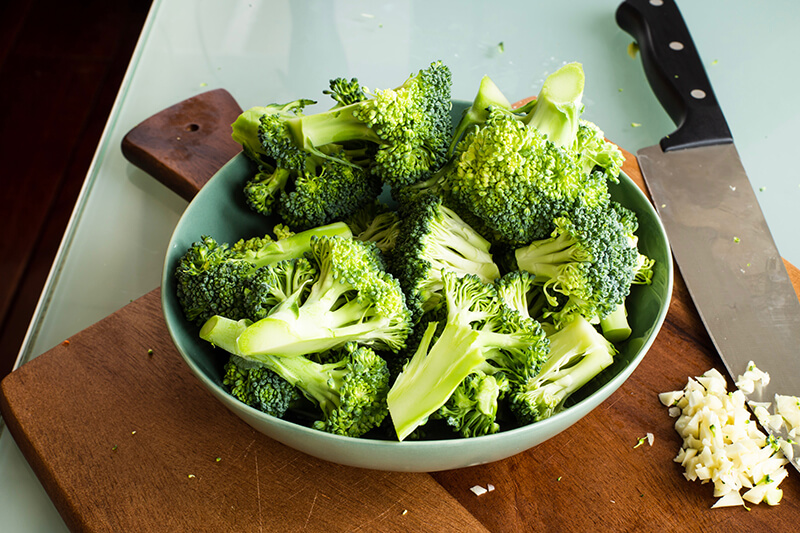
11. Broccoli
This cruciferous vegetable does more than resemble miniature trees. It can help you power your brain, too. Broccoli contains a lot of glucosinolates, which is a compound that breaks down into isothiocyanates that help protect your brain from neurological decline. This crunchy veggie also contains tons of antioxidants, vitamins, and flavonoids that help with memory and learning.
Broccoli is also rich in fibre, which helps you stay full by regulating your digestive system and can also assist in regulating blood pressure and blood sugar levels.
Snack ideas:
● Raw broccoli dipped in hummus
● Broccoli cheddar bites
● Crustless broccoli quiches
● Broccoli slaw
● Steamed broccoli with cheddar cheese
● Broccoli tots
12. Beets
While they don’t really sound like the most appealing study snack in the world, beets are an often overlooked brain food for studying. These root vegetables help improve blood flow to the frontal lobe of the brain, which is the key area of the brain that gets put to work when you’re memorizing, focusing, concentrating, and absorbing information.
Snack ideas:
● Pickled beets
● Beet puree on baguettes or crackers
● Baked beet chips
● Roasted beets
● Beet dip with veggies
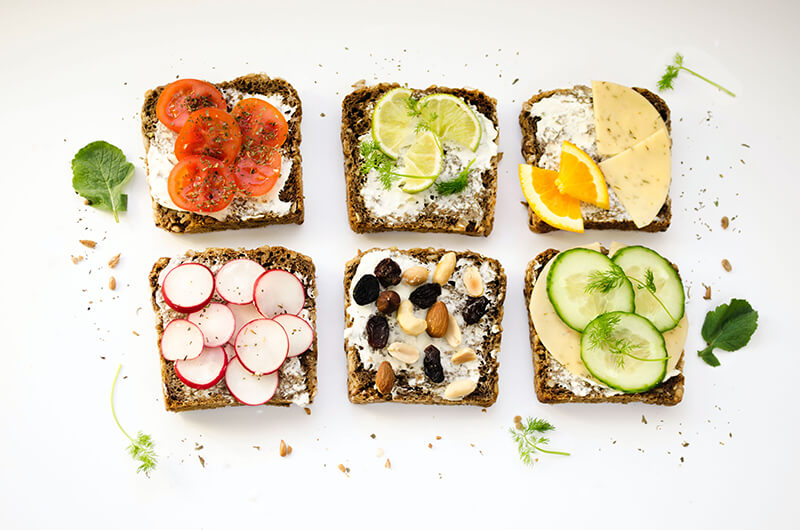
13. Whole Grains
You likely already know that whole grains are good for you and should be part of any well-rounded diet, but did you know that whole grains are also good for the brain? Whole grains are a great brain food for studying because they are a great source of that protective vitamin E we mentioned before. They also contain antioxidants, other important vitamins and nutrients, and tons of fibre. In fact, whole grains are so good for your brain function that they can also reduce your risk of stroke.
Here are some examples of whole grains: quinoa, brown rice, popcorn, oatmeal/oats, buckwheat, millet, whole rye, and bulgur. You can commonly find them in pastas, some cereals, bread, and some baked goods.
Snack ideas:
● Whole grain crackers and hummus
● Oatmeal with berries
● Greek yogurt topped with whole grain granola
● Sandwiches on whole grain bread (go for tuna for extra brain fuel)
● Whole grain avocado toast
● Air popped popcorn
● Quinoa muffins
● Burrito bowls with brown rice and beans
14. Sunflower Seeds
If you love to munch on sunflower seeds, we’ve got some great news for you: this crunchy snack beloved by baseball fans is also an excellent source of brain fuel. These little seeds are full of fantastic antioxidants as well as those helpful flavonoids we mentioned above that help you with better information intake.
Sunflower seeds do contain a lot of calories, however, so make sure that you’re eating them in moderation. When you’re zoned in on studying, it can be easy to keep mindlessly reaching into the bowl. Try to pour out only a portion at a time to keep yourself on track.
Snack ideas:
● Flavoured store-bought sunflower seeds
● Trail mix
● Apples dipped in sunflower seed butter
● Homemade granola bars with sunflower seeds
● Sunflower seeds sprinkled on a salad
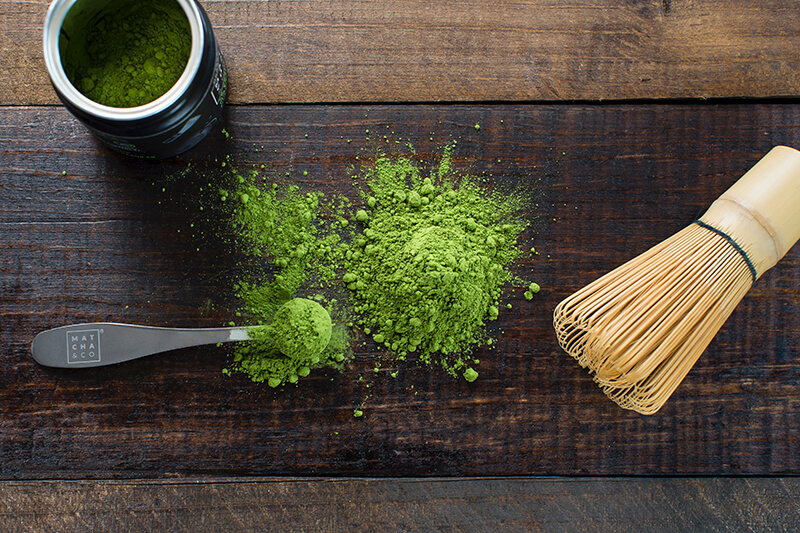
15. Green Tea/Matcha
Reaching for a cup of green tea to energize yourself might be one of the best ideas during study time. Green tea contains L-theanine, which is linked to better brain performance, higher energy levels, and stress management. It also contains caffeine, which as we mentioned above, can help you stay alert, improve concentration, and help you absorb information.
Matcha powder contains even more L-theanine than regular green tea, and it can be added to tons of different recipes and foods. This is because matcha powder uses the entire tea leaf, so it’s able to maintain the full range of nutrients in the plant while green tea is more refined. As a result, matcha also contains a lot of natural antioxidants that help with memory and learning, increased reading time, and a better attention span.
Snack ideas:
● Matcha green tea smoothies
● Banana and matcha “ice cream”
● Matcha tea lattes
● Chia seed matcha pudding
● Matcha protein bites
● Coconut matcha bars
16. Citrus Fruits
Citrus fruits, such as grapefruits, oranges, lemons, and clementines, are known for their high vitamin C content. In fact, eating just one orange a day will give you the full recommended daily dose of vitamin C, which is important for your overall health.
However, citrus fruits also have tons of brain fuel hidden inside. Citrus fruits contain over 60 different antioxidants, flavonoids, and anti-inflammatory compounds that are important for brain function. These compounds also help you prevent breakdown of cells in the nervous system, which is important for fighting off neurodegenerative diseases.
Be careful if you’re opting for store-bought fruit juices instead of the fruit itself. While fruit juice does have the vitamins that raw fruit does, these juices are also packed with refined sugars that can cause weight gain, liver disease, heart issues, and more. With fruit, the pure form is always better.
Snack ideas:
● Sliced oranges with dark chocolate
● Homemade orange juice (without additives)
● Citrus fruit salsa
● Dehydrated citrus fruit snacks
● Grapefruit mousse
● Citrus fruit smoothies
17. Pumpkin Seeds
This popular fall-season snack is as healthy as it is tasty. Pumpkin seeds are rich in zinc, antioxidants, and healthy fats. All of these minerals are important for brain health and brain cell regulation.
If you’re finding yourself doing a lot of late night studying and you’re feeling the effects on your sleep cycle, pumpkin seeds can also help you with this. Pumpkin seeds have a high level of the amino acid tryptophan, which is associated with better sleep regulation because it converts to melatonin.
Snack ideas:
● Roasted pumpkin seeds
● Greek yogurt topped with pumpkin seeds
● Pumpkin muffins topped with pumpkin seeds
● Add pumpkin seeds to trail mix
●Rye and pumpkin seed whole grain crackers
18. Beans and Lentils
Known as the musical fruit if you heard that schoolyard rhyme when you were little, beans are packed with tons of great brain fuel. These small but mighty foods come full of B vitamins, fibre, and other important minerals. They also release energy in the body slowly over time, which helps you stay awake and focused for longer throughout your study session. Beans are also known to be a great source of omega-3 fatty acids that boost brain health. While all beans have some level of omega-3s, pinto and kidney beans have the highest.
Snack ideas:
● Baked beans (pairs well with eggs)
● Bean dip with veggies or whole grain crackers
● Homemade bean hummus
● Hearty minestrone soup
● Chili
● Roasted chickpeas
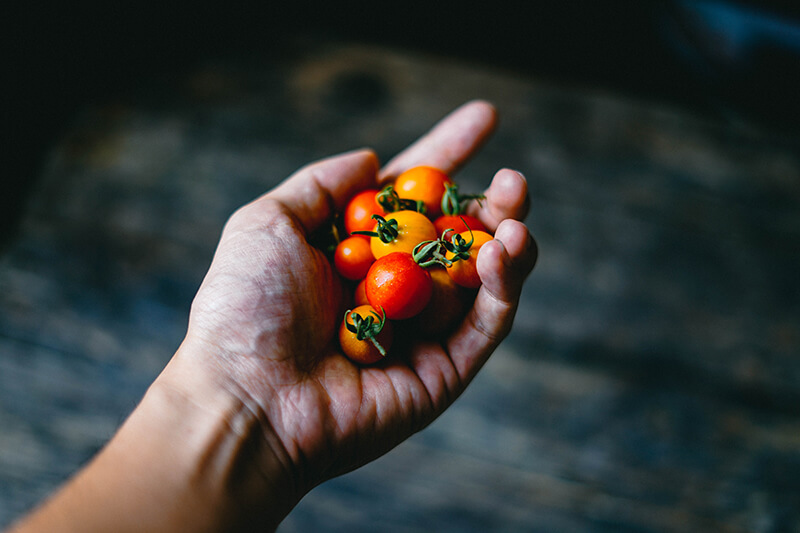
19. Tomatoes
While it often masquerades as a vegetable, tomatoes are a fruit that do amazing things for your body and your brain health. One of the antioxidants found in tomatoes is lycopene, which is a very helpful nutrient that can protect your brain against damage caused by those free radicals and toxins we mentioned above. In fact, tomatoes are the richest source of lycopene in the Western diet, and it can be found in all forms of tomato products – even ketchup, despite its high sugar content.
Tomatoes are also approximately 95% water, which can help you stay hydrated when you’re studying for long periods of time.
● Snack ideas:
● Sliced tomatoes topped with balsamic vinegar
● Homemade tomato soup or gazpacho
● Cherry tomatoes in salad
● Whole grain pasta with tomato sauce
● Baked tomatoes with cheese
20. Watermelon
This sweet summer treat comes with tons of antioxidants and vitamins that we’ve mentioned on this list, including lycopene. However, the main reason watermelon makes a great snack for studying isn’t necessarily for its brain-boosting powers, but for its hydration powers.
Staying hydrated is a very important component of making your studying time more productive and acing exams or tests. The brain relies on water and fluid intake to continue communicating and sending messages through the nerves, and if you don’t get enough hydration, you’ll quickly experience a drop in memory, learning, information intake, decision making, and more. Watermelon is 92% water, making it an excellent tool to keep you hydrated for optimal memory and learning.
Snack ideas:
● Watermelon slices or chunks
● Frozen watermelon puree (sherbet)
● Watermelon fruit popsicles
● Balsamic chicken and watermelon salad
● Fruit pizza with watermelon as the base
● Watermelon and feta salad
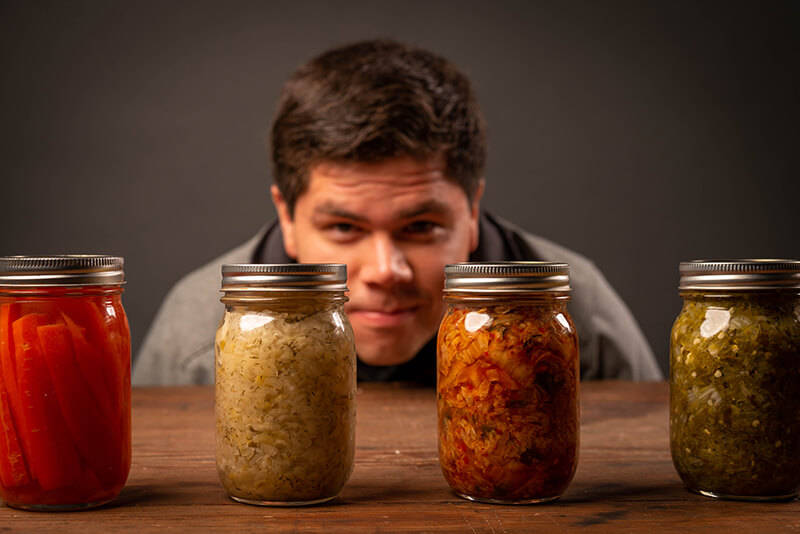
21. Fermented Kimchi
Fermented foods, like kimchi, are great for you because the fermenting process adds probiotics and microorganisms that are beneficial for your gut health. You may be wondering why that would even be mentioned on a list of the best snacks for brain fuel, but what you may not realize is that gut health is directly connected to brain health. Therefore, foods that contain live active cultures and probiotics can help you maintain cognitive function as well as digestive function.
Snack ideas:
● Kimchi and celery sticks
● Creamy kimchi dip
● Kimchi slaw
● Add kimchi to stir fry dishes
● Kimchi miso soup
● Brown rice with kimchi
22. Ginseng
The ginseng plant has a world of health benefits in every part of the plant, from the root to the stalk. Firstly, ginseng has been linked to improved frontal lobe function and cognitive preservation. Secondly, ginseng produces some of the benefits you can get from caffeine, as it can boost your natural energy levels to help you stay alert, awake, and focused. Lastly, ginseng has also been linked to lower blood pressure and blood sugar levels, which are both key for brain function.
Snack ideas:
● Ginseng tea
● Korean ginseng soup
● Add ginseng to smoothies
● Iced ginseng tea
● Ginseng date squares
23. Cheese
Yes, you can still eat cheese when you’re eating for brain health! Cheese is a whole food that contains B vitamins, protein, and other nutrients that help the brain regulate and grow neurotransmitters, tissues, and enzymes. It can also help you prevent cavities and keep your teeth healthy as a nice bonus. Cheese that comes from grass-fed cow milk retains the highest levels of these important nutrients, so choose grass-fed whenever possible.
However, as you may already know, eating too much cheese can lead to weight gain, heart disease, and other health problems, so make sure you don’t overdo it when you’re snacking away.
Snack ideas:
● Sliced cheese and whole grain crackers
● Cheese sticks (non-processed)
● Warm cheese dip with veggies or whole grain crackers
● Garlic bread made with whole grain bread and cheese
● Baked cheese crisps
● Taco dip with cheese, beans, and guacamole
24. Greek Yogurt
Similar to cheese, Greek yogurt contains B vitamins, protein, and tons of probiotics that help your brain function. Additionally, just like the probiotics in fermented foods we mentioned before, these probiotics can also help you maintain gut health and therefore brain function. Those powerful probiotics can also help regulate your stress levels, anxiety, and emotional wellbeing, which are also important factors for studying that you should never overlook. The more stressed and burned out you are, the more your memory and learning abilities will slip.
When you’re shopping for Greek yogurt, make sure you don’t fall for the marketing tactics of “Greek-style” yogurts. These are not the same thing, and typically “Greek-style” yogurt is just regular plain yogurt with added thickening agents to replicate the thicker texture of real Greek yogurt. It will not contain the same number of nutrients that real Greek yogurt has.
Snack ideas:
● Greek yogurt parfait with whole grain granola, berries, and nuts
● Substitute for sour cream in dips or toppings
● Overnight oats with Greek yogurt and skim milk
● Greek yogurt protein pancakes
● Tzatziki dip and veggies
● Greek yogurt popsicles with berries
25. Soy
While soy can sometimes get a bad rep from the anti-GMO crowd, it can do wonders for your brain health in the long run. Soy products contain polyphenols, which are antioxidants known for reducing the risk of early onset dementia, preserving brain function over time, and improving cognitive abilities. As long as you eat soy in moderation, you can reap the brain health benefits for your studying time.
Snack ideas:
● Roasted soybeans
● Wasabi beans
● Steamed edamame
● Dark chocolate covered soybeans
● Add roasted soybeans to trail mix
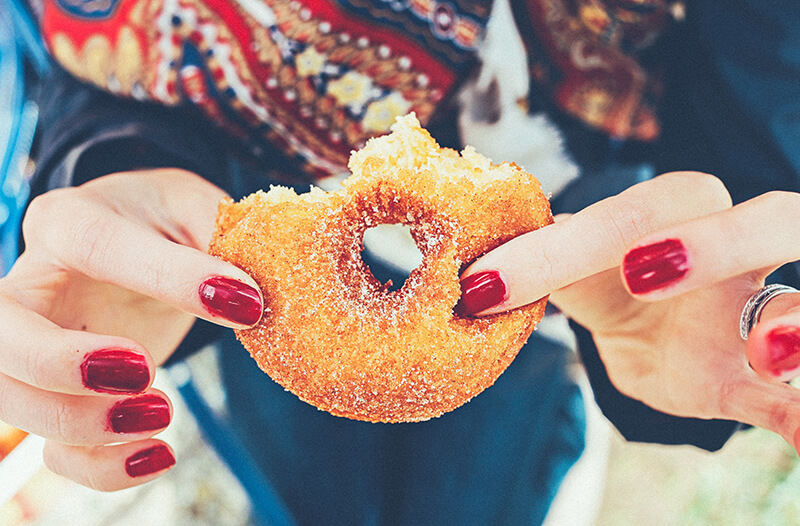
Foods You Should Avoid While Studying
These foods should stay off your list of brain food for studying, and outside your study sessions they should still be consumed only in moderation.
● Alcohol: It seems fun at the time, but alcohol leads to memory loss, poor decision making skills, and poor cognitive performance. Save the adult beverages for post-exam celebrations.
● Sugary drinks: Remember when you were younger and your parents told you that drinking too much soda would rot your teeth? As it turns out, it can rot your brain, too. Sugary drinks contain high-fructose corn syrup, which is directly linked to memory and learning impairment (among many other health conditions).
● Refined sugar: This one goes hand in hand with those sugary drinks we just mentioned. Sugary foods can lead to impaired memory function because high sugar levels don’t metabolize as easily in the brain, which can lead to cell damage or slow development of new cells.
● Processed foods: Highly processed foods, like instant noodles and ready-made meals, contain a lot of calories and fat, and very little brain fuel. Studies have shown that people who eat a lot of processed foods have lower scores when they’re tested on memory and learning functions than people who have healthy diets.
● Refined carbs (such as white bread and pasta): These foods don’t have enough fibre to slow down digestion, which means they can rush through your system and increase blood sugar levels. This can lead to impaired memory function even just after one meal. If you’re going to eat bread or pasta, choose whole grain versions.
You Focus on the Food While We Focus on the Work
If you just can’t kick that junk food habit, Homework Help Global can help. We may not be able to sit in on your in-person exams for you, but we can certainly take a load of work off your plate while you sit back and enjoy your snacks.
We provide a range of resources, services, and advice to help you stay on track with all of your academic goals. From custom essay writing services to professional editing services, all of the tools for success are just a click away. Whether you want someone to write your entire assignment for you or just need some quick advice from our blog, we’re here to help.
To order your next assignment, use our online ordering system or get a free quote from our operations team here.
Share:

